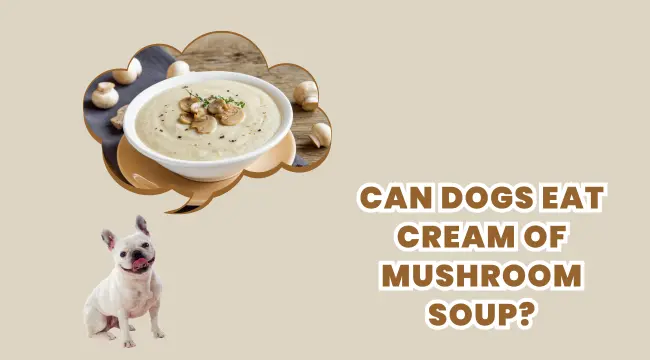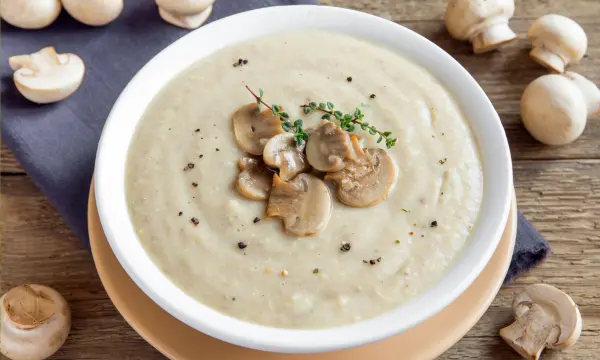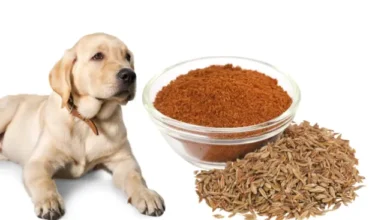
Cream of mushroom soup is a beloved comfort food, cherished for its rich, creamy texture and savory flavor. It’s a common ingredient in various recipes and a favorite quick meal for many households. However, as dog owners, we often find ourselves wondering which of our favorite foods are safe to share with our four-legged friends. This article dives into whether cream of mushroom soup is a suitable choice for dogs. We’ll explore the ingredients commonly found in this soup, discuss the nutritional aspects, and highlight potential health risks to help you make an informed decision about your pet’s diet. Join us as we unravel the facts behind one of the most common queries from dog owners: Can dogs eat cream of mushroom soup?
Can Dogs Eat Cream of Mushroom Soup?
No, it is generally not recommended to feed cream of mushroom soup to dogs. The soup often contains ingredients that can be harmful to your pet.
Explanation:
Cream of mushroom soup typically includes ingredients like onions, garlic, and large amounts of salt, all of which can be toxic to dogs. Onions and garlic can cause gastrointestinal irritation and could potentially lead to red blood cell damage. High levels of sodium present in canned or store-bought soups can also be unhealthy for dogs, potentially leading to sodium ion poisoning. Additionally, many dogs are lactose intolerant, and the dairy content in cream-based soups can cause digestive issues, including diarrhea and vomiting.

Alternative Food: Instead of cream of mushroom soup, consider offering your dog a homemade broth made from dog-safe vegetables and meats. For example, you can simmer carrots, celery, and chicken (with no added salt or seasonings) to create a nutritious and tasty broth that is much safer for your dog. Always ensure that any homemade broth or soup is free from harmful ingredients like onions, garlic, and excessive salt. This not only offers a healthier alternative but can also be used to add flavor and moisture to your dog’s regular dry food.
Nutritional Content of Cream of Mushroom Soup
Cream of mushroom soup, while delicious and comforting for humans, contains various nutritional components that may not be ideal for dogs. Here’s a breakdown of its main nutritional elements and an examination of any potential benefits for dogs:
Main Nutritional Components:
- Calories: Cream of mushroom soup is relatively high in calories, primarily due to its cream base. A typical serving can contain a substantial amount of calories, which might contribute to unnecessary weight gain in dogs if consumed regularly.
- Fats: The fat content in cream of mushroom soup is also high, again due to cream and other ingredients like butter. While dogs need fats in their diet, the types of fat present in this soup are not necessarily the healthiest for dogs, and excessive fat intake can lead to pancreatitis, a serious condition in canines.
- Sodium: One of the most concerning elements in cream of mushroom soup is its sodium content. Soups, especially canned varieties, are often loaded with salt to enhance flavor and preserve the product. High sodium intake can be particularly dangerous for dogs, leading to increased blood pressure and even heart disease.
- Carbohydrates: Soups generally have moderate levels of carbohydrates, coming from the flour used to thicken them and any added sugars. While carbohydrates are a part of a balanced diet, the simple carbs in cream-based soups offer little nutritional benefit to dogs.
Potentially Beneficial Ingredients:
- Mushrooms: In theory, certain types of mushrooms can provide beneficial nutrients such as vitamins and antioxidants. However, the types of mushrooms used in commercial cream of mushroom soups are usually not specified and are cooked in ways that could negate these benefits.
- Vitamins and Minerals: Depending on the specific recipe or brand, cream of mushroom soup might contain various vitamins and minerals. For example, some soups might have added vitamin D or calcium, which are beneficial for a dog’s bone health. Nevertheless, the potential risks of other harmful ingredients overshadow these benefits.
Potential Health Concerns with Cream of Mushroom Soup for Dogs
Cream of mushroom soup may be a staple in many kitchens, but it contains several ingredients that could pose significant health risks to dogs. Here’s a detailed look at these concerns:
Harmful Ingredients in Cream of Mushroom Soup:
- Onions and Garlic: Both onions and garlic are part of the allium family and are commonly used to enhance the flavor of cream of mushroom soup. These ingredients are toxic to dogs; even in small amounts, they can cause oxidative damage to red blood cells, leading to anemia. Symptoms of allium poisoning might include weakness, vomiting, breathlessness, and a high heart rate.
- High Sodium Content: Sodium is often added to soups to improve taste and preserve the product. However, excessive sodium intake in dogs can lead to serious complications such as sodium ion poisoning. Symptoms include vomiting, diarrhea, excessive thirst or urination, lethargy, and in severe cases, seizures and death. Dogs with heart or kidney issues are especially at risk from high-sodium foods.
- Other Additives: Preservatives and artificial flavorings are also common in canned or pre-made soups. Some of these additives can be harmful or cause allergic reactions in dogs.
Effects of Dairy Products on Dogs:
- Lactose Intolerance: Many dogs are lactose intolerant, which means they lack the enzyme needed to digest lactose, a sugar found in dairy products like the cream used in mushroom soup. Consuming dairy can lead to gastrointestinal symptoms such as gas, diarrhea, and vomiting.
- High Fat Content: Dairy products can be high in fat, which is difficult for dogs to digest. Overconsumption of fatty foods can lead to pancreatitis, an inflammation of the pancreas that can be painful and may become severe.
Risks of Feeding Dogs Processed Foods
Processed foods, including canned soups, are generally not recommended for dogs due to several health risks associated with their ingredients and preparation methods. Below are some reasons why these foods can be detrimental to a dog’s health.
Nutritional Imbalance:
- Non-Specific Ingredients: Processed foods often contain low-quality and non-specific ingredients that might not provide the balanced nutrition dogs need. Ingredients like “meat by-products” or “animal fat” can vary widely in their nutritional content and are not tailored to meet a dog’s dietary requirements.
- High in Fillers: Many processed foods contain fillers such as corn, wheat, and soy, which offer little nutritional benefit to dogs and are used primarily to bulk up the product. These can lead to weight gain and do not provide the high-quality protein dogs need.
Preservatives and Additives:
- Chemical Preservatives: Processed foods like canned soups often contain preservatives to extend shelf life. Common examples include BHA, BHT, and ethoxyquin, which have been linked to health concerns in dogs, including potential carcinogenic effects and allergic reactions.
- Artificial Colors and Flavors: Artificial additives are used to make the product more appealing but offer no nutritional value. Some of these additives can cause adverse reactions in dogs, such as skin irritations and gastrointestinal upset.
High Sodium and Sugar Levels:
- Excessive Sodium: As with human processed foods, dog food products and canned soups can contain high levels of sodium. While necessary in small amounts, too much sodium can lead to serious health issues in dogs, such as heart disease, hypertension, and kidney damage.
- Added Sugars: Sugars are sometimes added to enhance the taste of processed foods but can lead to obesity, dental problems, and even diabetes in dogs.
Potential for Toxins:
- Contamination Risks: Processed foods are at a higher risk of containing toxins and contaminants due to the scale and methods of manufacturing. This includes the risk of bacterial contamination like salmonella, which can affect both pets and humans handling the food.
How to Safely Introduce New Foods to Your Dog’s Diet
Introducing new foods into your dog’s diet should be done carefully to avoid any digestive upsets or allergic reactions. Here are some tips to ensure a smooth transition:
Gradual Introduction:
- Start Small: When introducing a new food to your dog, start with a small amount to see how they tolerate it. Gradually increase the portion over several days if there are no adverse reactions.
- Mix with Current Food: Mix the new food with your dog’s current diet in small amounts, gradually increasing the new food while decreasing the old, to help their digestive system adjust.
Monitor for Reactions:
- Observe Your Dog: Keep an eye on your dog for any signs of allergic reactions or digestive issues, such as itching, hives, vomiting, diarrhea, or excessive gas. If you notice any of these symptoms, discontinue the new food and consult your veterinarian.
- Portion Control: Ensure that any new foods are given in moderation to maintain a balanced diet and prevent weight gain.
Consult Your Veterinarian:
- Always discuss any diet changes with your veterinarian before introducing new foods. They can provide guidance based on your dog’s specific health needs and conditions.
FAQs
Can dogs have mushroom-based dishes?
Dogs can safely consume certain types of mushrooms, but many varieties are toxic. Only provide mushrooms that are known to be safe for dogs, and always cook them without any added ingredients. Avoid wild mushrooms completely due to the risk of toxicity.
What are the symptoms of food poisoning in dogs?
Symptoms of food poisoning in dogs can include vomiting, diarrhea, lethargy, loss of appetite, and in severe cases, seizures or collapse. If you suspect your dog has food poisoning, contact your vet immediately.
How often can dogs have human food as treats?
Human food should be given sparingly as treats and should not make up more than 10% of a dog’s diet. Choose healthy options like plain cooked meats, certain fruits, and vegetables, and avoid foods with spices, unhealthy fats, and toxins.
Conclusion
To recap, while certain human foods can be shared with dogs, it is crucial to proceed with caution. Cream of mushroom soup, as discussed, contains ingredients that could be harmful to dogs, highlighting the broader risks associated with feeding dogs processed and human foods. Always prioritize specially formulated dog foods that meet all of their nutritional requirements. Human foods should only be introduced after consulting with a vet and should only be a small part of a dog’s diet to ensure their overall health and well-being. Remember, what is safe for humans can often be hazardous for dogs, so making informed choices about your pet’s diet is key to their health.



